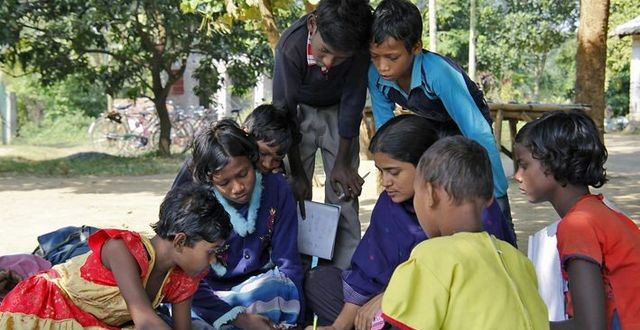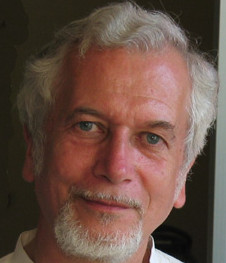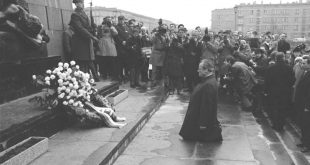5th Instalment
The Tale of Two Villages
I’ve been living in India for over forty years, the last thirty of which have been in the small university town of Santiniketan, some 150 kilometres north of Calcutta. I studied there to start with, then I stayed, to translate the work of the major Indian writer Rabindranath Tagore from Bengali into German. I translated the conversations of the Hindu saint Sri Ramakrishna, as well as writing and publishing books about Hinduism and the dialogue of religions. Thirty years ago, in two tribal villages, I started setting up a different kind of development aid together with two young men from these villages. This collaboration was the subject of a recent lecture at Quinta dos Vales in Estombar near Lagoa.
I was accompanied by Madan Thapa Magar, whom I had met the previous year in Nepal. I had been invited by a couple to go on a trek in the Manaslu region to the west of Kathmandu, which would lead to the little known Tsum valley. We were trekking for two weeks. We were accompanied by a team of porters and kitchen staff, as well as two mountain guides. The guide who attached himself to me was 23-year-old Madan Thapa Magar. I was impressed by his attentiveness and devotedness on the difficult path through the mountain valleys. He walked steadfastly one step behind me, warned me, helped me, waited patiently while I got my breath back, sang happy Nepali film songs and gave my efforts the positive focus and joy that I couldn’t find on my own.
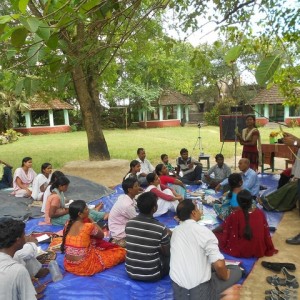
In the evenings, we got into conversation. Madan told me about his difficult life. He is the son of a poor family with many children in a mountain village in the Solukumbhu district. He went to school in the neighbouring village, but as a 15-year-old he began to earn money for the family. He worked on road and house construction to earn money for after-school coaching. Several times a year, he trekked through the famous mountain regions as a porter for tourists. You can picture it more or less like this: a boy, not yet fully grown, walking along dangerous mountain paths often at a great height, with 30 kg and more on his back. Once he fell dangerously ill. For months on end, he missed his classes. But he didn’t give up, like many others, but continued at school and, at the time I met him, had just gained admission to study at university. Madan’s ambitiousness and willpower were the second thing that impressed me about him. In the meantime, he has been able to give up his job as a trekking guide and is studying business in Kathmandu.
I invited Madan to come to Europe with me to take part in my programme of visits and lectures that was taking me through half of Europe. I had been invited to Germany, Italy and Portugal in order to report on my work in the Indian villages. For his part, Madan was to talk about his village life in Nepal. Last May, I visited Madan’s village Merangdi in Solukhumbu with him and had the chance to spend a week in the home of his large, multi-branched family. Madan had taken photos that we could show people. That was how the event at Quinta dos Vales came about.
INDIA
I had decided early on that I didn’t only want to work in India as a German lektor, not only to study and work as a writer, but to live as closely as possible to the local people. Living together in such a way invariably and organically leads to mutual help and support, in a way which is both possible and necessary among friends. I never became a professional aid worker, never worked in the villages for a salary but regarded my activity as the extension of the service of a friend, for pleasure.
As it was important for me to establish a close, friendly relationship with the people in the villages, I radically simplified my lifestyle. I live very simply, with no television or radio, with no air-conditioning or fridge. I was built a tiny, mud-brick house in Ghosaldanga, where I spent the night when I visited the villages. In this way I feel a connection with the lives of the local people and with nature.
Does social development work cost money? – No, not much. First of all, I discovered Sona Murmu, the only boy at that time in Ghosaldanga who had got as far as completing the 10th grade at school. I supported him to enable him to go to college. In return, he undertook to set up an evening school for the children in the village. That was how it began.
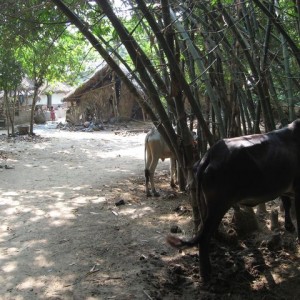
In addition, we planted hundreds of trees year by year. That doesn’t cost anything, but requires manpower and discipline. It is good training in many areas and transforms the environment more radically and more positively than any other development. The third thing was medical care, still rudimentary in those days. We took sick people to the doctor and ensured that they took their medicines. I was aware that we couldn’t motivate people to participate in development work if we didn’t support them at times of crisis – for example in the event of accidents and illness, births and deaths.
So the work began that has gradually grown over the years and decades. We have now set up evening schools in five villages, and a daytime school with boarding houses for girls and boys. Over a hundred young people have completed their studies at the school, and there are many young men and women doing college and university courses. Medical care has been professionally organised by a German doctor and a large garden growing organic fruit and vegetables supplies our school children.
NEPAL
Madan Thapa Magar moved to the capital Kathmandu five years ago because he was unable to get any further education in his village. He lived with relatives, went to school and earned his living as a mountain guide. He had learnt enough English to progress from porter to guide. When at last he was able to start his studies, he opted for studying business. Why? I asked him. – The answer was clear and simple: “After my studies I want to earn a lot of money. I am most likely to do so with this course!”
Let us have a look at Madan’s situation: his parents were in debt, his brothers, who didn’t go to school, have low-paid jobs as a woodcutter and the owner of a small shop. For six years, the older brother was earning as a simple worker in Iran and Dubai. Many other members of Madan’s Magar tribe and neighbours in the village were either employed in trekking or were working in the Gulf States and Malaysia under hard, often brutal conditions. Madan was trying to escape this vicious circle through better education, which mostly leads to better working conditions and higher salaries.
He started thinking about his ambition when he got a sponsor who made it possible for him to study at university. What were this man’s motives? He didn’t want his money back, he simply wanted to help anonymously so that a person could have a better future, and trusted Madan not to misuse these funds. Towards the end of the first year of his studies and a few weeks before his visit to Europe, Madan told me on the phone that he wanted to become a social worker – in his village or nearby. When someone who doesn’t belong to his family or his tribe does so much for him then he would like to do something for less privileged people in his area.
PORTUGAL
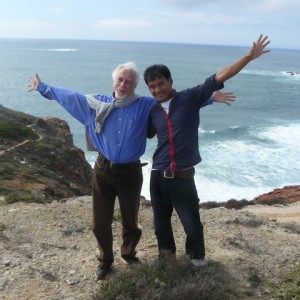
Madan told this story for the first time in Portugal: of his wish to stay in his country, in order to “do something” there. Of his attempt to swim against the tide and despite that, or maybe for that very reason, to find fulfilment. He showed photos of the journey to his village. How he set off by jeep in the early morning darkness and returned to his village along bumpy tracks in the evening. How he slept at relatives’ houses and continued the journey the next morning on foot until he reached Merangdi two or three hours later. He showed photos of the everyday chores at home, in the kitchen, in the yard and the fields. For example, of two oxen pulling the plough and of his mother walking behind scattering the seed. Of cooking and the preparation of food. Of the life of his ageing grandfather, who lives with the family because no one wanted to send him to an old people’s home.
What do you want to be? I asked Madan during the event. – “I want to do something for my family and my village. I don’t know how yet but I am preparing myself for this task with my studies,” he said.
Thank you.
You can find more information at www.dorfentwicklung-indien.de Martin Kämpchen works in India as a journalist, translator and writer for the Feuilleton of the FAZ, for Ceylon Today, The Statesman and others.
His books have been published by Rowohlt, Insel and Herder.
 Eco123 Revista da Economia e Ecologia
Eco123 Revista da Economia e Ecologia

